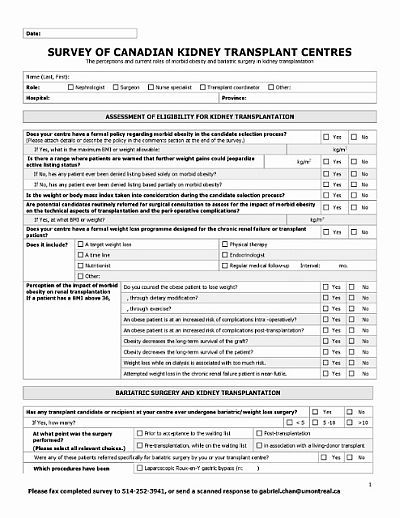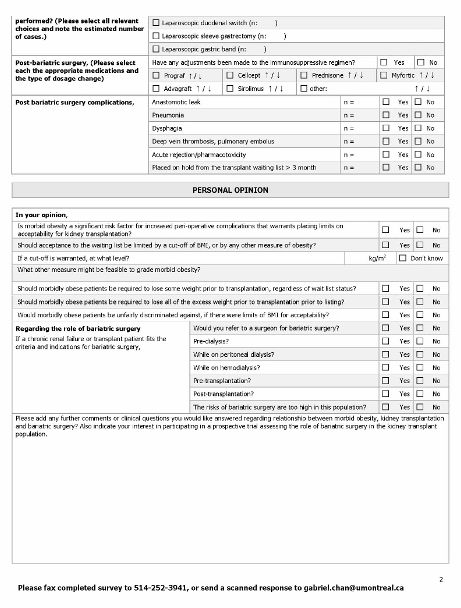National Survey of Kidney Transplant Centres: Policy on Morbid Obesity in the Transplant Patient
Hopital Maisonneuve-Rosemont, Montreal, QC, Canada
Meeting: 2013 American Transplant Congress
Abstract number: D1478
Morbid obesity is common in the dialysis population, for whom weight loss is difficult due to fatigue and malaise. Post-transplantation, obesity is further exacerbated due to steroids and the unshackling of dietary restrictions. Many studies have shown worse outcomes associated with obesity, including peri-operative complications, shortened graft- and overall survival. At present, there are no national guidelines regarding obesity in transplantation in either Canada or the US.
Methods: A survey was sent by e-mail to the CST Adult Kidney Group.


Results: Thirty responses, representing 16 centres, were returned. 14 centres have an official policy, with the maximum BMI varying between 32 – 40 kg/m2. Despite the BMI limit, only 8 centres had a weight loss programme.
Almost all counselled patients to lose weight through diet and exercise because of an increased risk of complications in the peri-operative period and a decreased overall survival. Few felt that weight loss while on dialysis was too risky or futile.
Most centres (67%) had an experience with bariatric surgery, although not all had referred the patient themselves. Few details of the surgery were known to the transplant team.
Almost all (> 90%) indicated that the risk due to obesity warranted a BMI limit, that some excess weight should be lost prior to transplantation and that they would refer to a bariatric surgeon if conservative measures failed.
Discussion: Local policies vary widely and are usually “soft”. Only a minority have a treatment algorithm for such patients. A national policy would be essential to ensure fair and equitable treatment of morbidly obese patients. Presently, bariatric surgery is one of the most common and effective operations. Transplant centres should play an active role in using this weight loss treatment to hopefully improve long-term outcomes for the graft and patient alike.
To cite this abstract in AMA style:
Chan G, Tran D, Senecal L. National Survey of Kidney Transplant Centres: Policy on Morbid Obesity in the Transplant Patient [abstract]. Am J Transplant. 2013; 13 (suppl 5). https://atcmeetingabstracts.com/abstract/national-survey-of-kidney-transplant-centres-policy-on-morbid-obesity-in-the-transplant-patient/. Accessed February 16, 2026.« Back to 2013 American Transplant Congress
